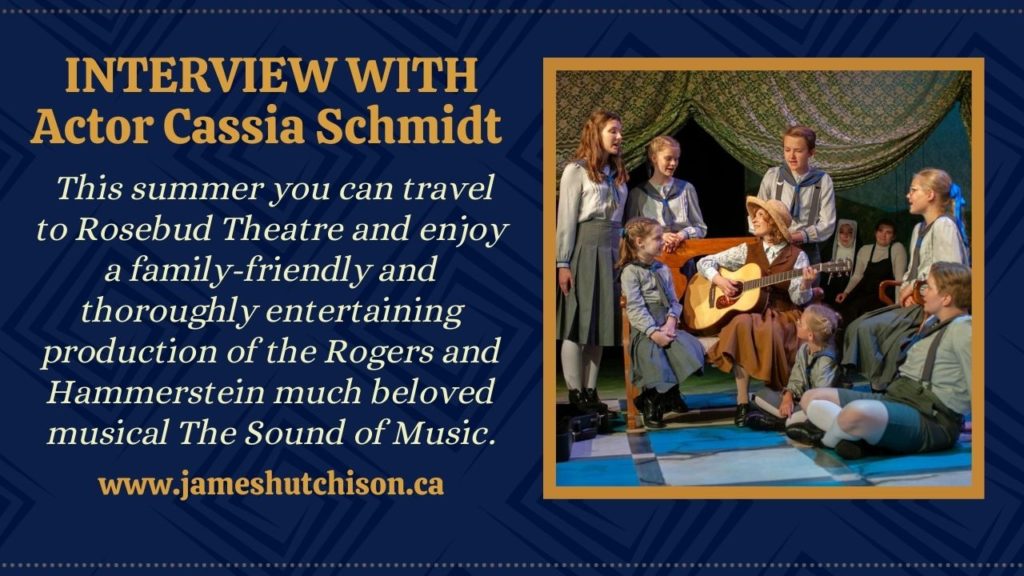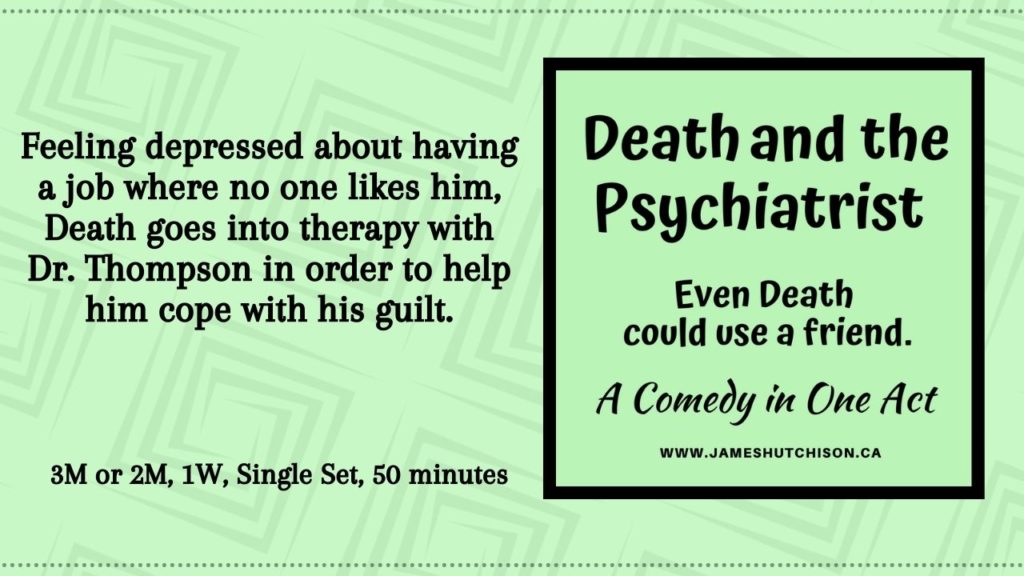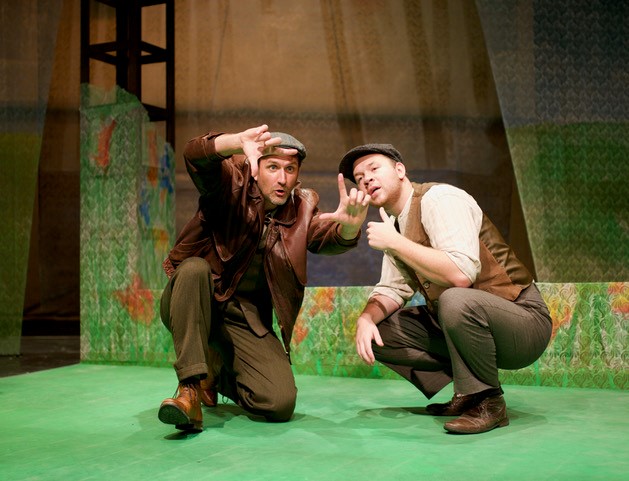
Rosebud Theatre’s production of Stones in His Pockets by Marie Jones is a highly entertaining and wonderfully crafted production. The play is designed so that two actors portray fifteen different characters. The story focuses on Jake Quinn and Charlie Conlon who have been hired as extras along with plenty of other town folk by a big Hollywood Studio that’s shooting on location in Ireland. Jake and Charlie are down on their luck, but Charlie has a screenplay that he feels could turn their fortunes around if he could get it into the hands of the right people.
The play stars Nathan Schmidt as Jake Quinn, Griffin Cork as Charlie Conlon, and is directed by Morris Ertman. Some of the other characters portrayed by Nathan and Griffin include Caroline Giovanni the American star of the film, Clem the film’s English director, Sean and Fin a couple of young lads from town, and Mickey a local in his seventies whose claim to fame is being one of the few surviving extras on the 1952 film The Quiet Man starring John Wayne.
Stones in His Pockets premiered at the Lyric Theatre in Belfast in 1996, and when it was produced at the Edinburgh Fringe Festival in 1999 it became a huge hit. From the Fringe the play moved to the West End in London where in 2001 it won the Olivier Award for Best New Comedy and the Olivier Award for Best Actor for Conleth Hill who many people may know better as Varys in the HBO Fantasy series Game of Thrones. From the West End the show travelled to New York for a successful Broadway run and since then has been performed by regional theatres throughout the world.
I was lucky enough to catch the opening night production of Stones in His Pockets and I had a thoroughly enjoyable, entertaining, and fun evening at the theatre. I sat down with the stars of the show Nathan Schmidt and Griffin Cork to talk with them about the play and we started our conversation by talking about the magic of the theatre and what that word means to them.
NATHAN SCHMIDT
I guess what people mean by magic is something unbelievable that happens right in front of them. And then coming to the theatre you experience the emotions of the story, and it all seems ethereal and magical, and all of a sudden you’re taken up in a story and carried along by the cast or a certain kind of music or the way the lighting cues hit, and it hooks everything up for you, and you become a part of this group of people as the audience experiencing the show. And it’s such a unique kind of experience that you don’t have very often. I think that’s part of what the magic is.
GRIFFIN CORK
I always relate it back to my grandmother a little bit. I always describe her as the ideal audience because she says her perfect show is one that makes her forget about her shopping list. And she likes to think that the story is being told for her only. That it’s her bedtime story is the way she puts it.
And to me, the magic of theatre is that it makes you believe the story. You start to care about that guy on stage and it’s the punch through of that suspension of disbelief. So, in this day and age, if you can make my grandmother forget about her shopping list, I think that’s pretty magical.
JAMES HUTCHISON
Well, I mentioned magic and we often see magic between actors, they have chemistry, they play well off each other. And I can definitely say after seeing the show last week that you guys have great chemistry. This is a two-person show where you’re playing multiple characters. So being in sync is absolutely essential. How much of that chemistry between the two of you was there naturally and how much of it is something that you work on through the process of rehearsal and the performance of the play?
GRIFFIN
I did my audition with Nate which gave our director Morris Ertman and us a pretty good idea about how well we naturally play off each other. And when we did the first read our set designer Hanne Loosen came up to me and said, “Have you read that with Nate before?” And I said, “No, not all the way through.” And she said, “Oh, yeah, you guys are just pinging off each other.” So, there was already bedrock there and I think our sensibilities and our senses of humour line up pretty well.
I don’t know that I ever actively worked on chemistry with Nate, but when you spend forty-five hours a week together you get to know somebody pretty well. And I think I also formed a rapport with our director Morris, and our stage manager Kalena, and our production stage manager Brad, but the audience doesn’t see that rapport because its not on stage. It’s kind of what rehearsal is for in a sense – to build chemistry with the people you haven’t worked with before.
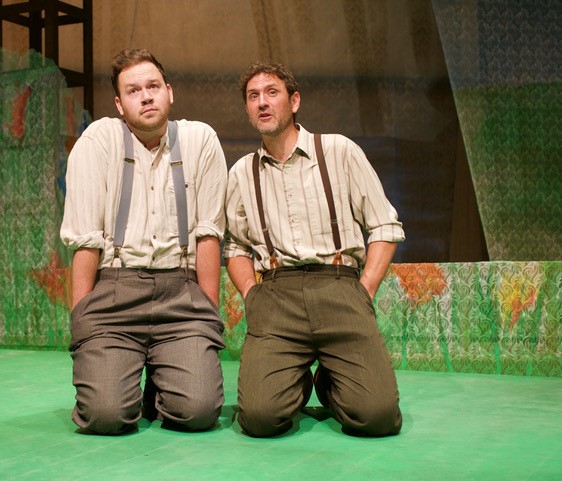
NATHAN
I think it was a John Cusack quote that said one of the skills the actor has is to develop a shorthand for deep relationships. So, it’s actually part of the skill set to be able to speak to each other with a depth of understanding that you maybe don’t actually own but that is actually there because of the trust you have for each other and because of the type of work that we do. We put ourselves in the other person’s hands. And for sure, there are some people you connect with more quickly. Griffin’s quite a bit younger, but we have similar sensibilities. So, I think that chemistry while some of it’s about the people I also think part of it is the skill set to go deep with people quickly.
JAMES
The play takes place in County Kerry, Ireland and the local town is being used as the location for a big Hollywood movie, and the locals are being used as extras. Tell me a little bit about this world, and the world of the play.
NATHAN
It’s really a town that’s lost so much of what made it a town, and people are hanging on there and staying because it is their hometown. So, we have Mr. Harkin selling his land – selling off a lot of his son Sean’s birthright – just to make ends meet because of an economic downturn in the local economy. That’s pretty relatable. And people have that small-town feeling of there’s nothing here for me. There’s no future for me. I have nothing to hope for. The older people are upset by that. They’re hanging on because this is where they’re from and there’s pride in that. The young people don’t see a place to connect and find a life. And then this movie comes and injects all this money into the economy because of the scenery and the beauty of the land and the forty shades of green but it’s just a location to them nothing more.
GRIFFIN
The play is full of harsh dichotomies. There are the people in the town, and then people who have come to the town for the film, the film crew. And even in those groups, there are dichotomies. The townspeople either love the movie or hate the movie. And then in the film, there are people who love Kerry and people who hate Kerry. And then the way that they shoot films is terrible. They dig up the landscape, and they over-inflate the economy, and they work the people to death, and then they leave without any regard really. So, for me, the whole show is about seeing people teeter-totter between the two sides. And I would say the play is exploring the nature of success. Like, what is success? Is it to be famous? Or is it to make a living in the place that you love?
JAMES
The show’s being performed in Rosebud. A hamlet an hour or so drive east of Calgary, not far from Drumheller. And I was hoping each of you could speak a little bit about your unique relationship with Rosebud. Nathan, you’re not only an actor in the show, but you head up the Rosebud School of Theatre’s acting department and make your home in the community.
NATHAN
I grew up in rural Alberta farther north. There was no theatre. Nobody went to the theatre. My family never went to the theatre. It just wasn’t part of the culture that I was in. But our school went to the Citadel Theatre in Edmonton every year. We’d go to a play, and I just thought it was the coolest thing.
And I kind of came to the awareness that it was actually a job that people did. There was a moment where I was like, “Wait a minute, that’s a job. That’s work. They’re at work. That looks like pretty cool work to me.” Everybody was saying, “Oh, you go to a university, and you get your career.” And I’m like, “But those people are doing theatre for a job. That’s pretty great, right?”
So, Rosebud came right along on the heels of those realizations, and it ended up being a place where I could stay connected to theatre and the whole town’s economy is based around doing theatre. And I really enjoyed doing the acting, but I also get to teach, and when I teach I’m constantly redefining and re-articulating and reworking how I work and how I engage story, and so Rosebud became a place to put down roots.
GRIFFIN
I think Rosebud is fantastic. There will always be a city boy inside of me that I can’t shake. But Rosebud is kind of idyllic in the sense of what you would picture a small town should be. Bill Ham the music director here at Rosebud also fixes bikes, and he fixed my bike in his garage. He didn’t train for it or anything he just liked watching videos and figuring out how to fix bikes. And we sat in his garage, and he fixed my bike, and I said, “Great, what do I owe you?” And he goes, “No, no, no.” And I said, “You fixed my bike and if I was in the city, I would pay the bike fixer.” And he said, “No, don’t ruin this.” And I went, “Okay.” So, I had to ask his daughter, who is my landlord, what he likes, and she told me, and so I bought him a big bag of Chicago mix popcorn. It’s that kind of community.
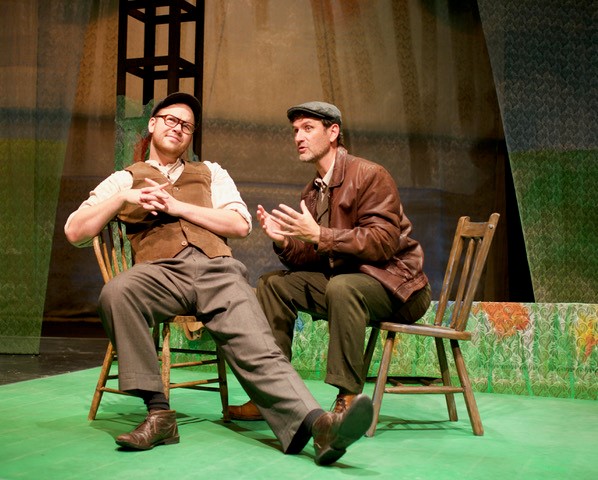
JAMES
So, the play takes place in Ireland and there’s the phrase “the luck of the Irish.” And that can mean that the Irish are inherently lucky, or it can mean that even though the Irish have had some hard luck they’ve overcome those hardships and gone on. How do you think the idea of luck relates to the story of Stones in His Pockets and what happens in the play and then second looking back on your own lives and careers what role do you think luck plays in our lives – how much of an influence do you think luck has on our path through this world?
GRIFFIN
I like exploring the idea of luck – especially through Charlie’s story. Charlie’s not lacking in ambition or initiative, but something switched for him when he partners up with Jake and they start to talk about doing a film about cows. His outcome hope is different. Before his ambition and initiative were leading to something more superficial. Getting to be famous, not working too hard, and getting to be rich. The cow film they talk about making is something they honestly believe in and a story they believe needs to be told.
NATHAN
When Charlie gets an opportunity with his script, he’s so used to not having anything good happen he says, “I knew no one would look at it. I knew no one would ever read it.” I think luck comes when we’ve got eyes enough to see the opportunity and know that we should grab hold of it and do it. And in hindsight, we call it luck. Well, isn’t it lucky that showed up when it did. But it actually was, I had enough awareness to step into my own agency and follow that path.
GRIFFIN
And I think luck has quite a bit to do with our industry but there are also things that you can do to prepare for a lucky break, and I think luck and opportunity are wasted without initiative and ambition.
NATHAN
I don’t have a rabbit’s foot and I don’t rub anything for luck. I don’t pay much attention to luck. But I do think it’s lucky that I found this place from the question you asked before. I wouldn’t have known about Rosebud but somebody that I’d gone to school with came over and I never had friends over because I was a bit of a loner and they came over to visit and said, “Oh, I heard about this place Rosebud,…” and this is right at the time when I was thinking about theatre as a future. “Oh, it’s a little theatre town in southern Alberta where they teach theatre.” And I was like, “Okay, I’ll try that.” And that was it. You can say, “Well, isn’t that lucky she came for a visit.” Or was it lucky that I said, “I’ll try that.” I don’t know. But I do feel lucky, I guess.
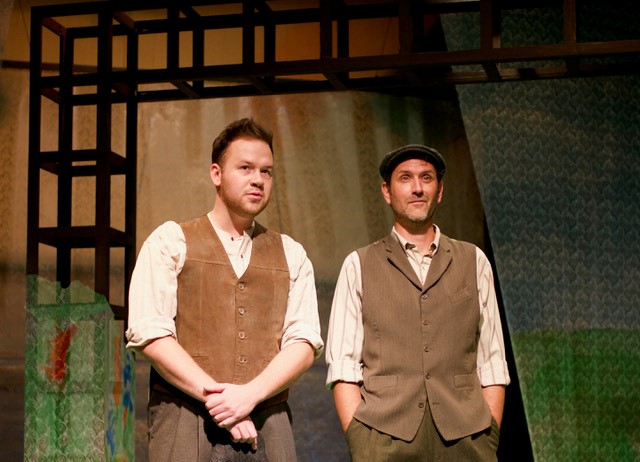
JAMES
Well, we’re coming out of COVID and it’s good to see live theatre up and running again and if people are looking at heading back to the theatre why should they head out to Rosebud to see this production of Stones in His Pockets?
NATHAN
We just had 170 people in the house today and they had a ball. This show is a good time and people are enjoying themselves. And I always think the drive out here is part of the whole experience. I think there’s something really connecting and nostalgic about the trip out here and then you get to see what we’ve been talking about. A really good play. It’s a good reason to come out. It’s just a delight to have a room full of people again. We just appreciate it and I find it so energizing and exciting.
GRIFFIN
And there is something very beautiful to me about watching a big show with a small cast. And theatre has something that other mediums like film will never have, and it’s that you get to do theatre in front of people that you know are there, and they know that you know they’re there. And you get to actually hear them laugh, or hear them cry, or hear them cough, or hear their phone go off.
NATHAN (Laughs)
Well, that’s the magic, isn’t it?
GRIFFIN (Laughs)
Yeah.
***
Stones in His Pockets by Marie Jones stars Griffin Cork as Charlie Conlon and Nathan Schmidt as Jake Quinn. Director Morris Ertman, Scenic Designer Hanne Loosen, Costume Designer Amy Castro, Lighting Designer Becky Halterman, Sound Designer/Composer Luke Ertman, Stage Manager Kalena Lewandowski, Stage Manager (Rehearsal) Brad G. Graham.
